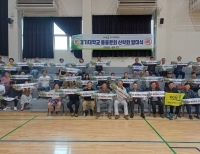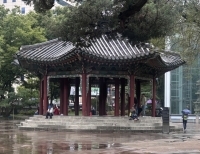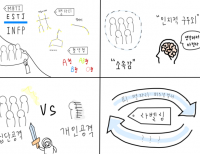The number of disasters seems to have increased recently. We have had the MERS crisis, the March sinking of the Sewol ferry earthquakes, and the avian flu outbreak. There is a growing controversy over the damage caused by various disasters and the government's late response to these crises. When similar disasters are reported in other countries, one can see that other advanced nations, responses to crises (Japan's AI response) can lessen the damage caused by these events. However, the South Korean government's disaster responses have resulted in more damage than in other countries because there have been problems dealing with these situations. Let's examine our government's responses to the two crises, the recent earthquakes in the Gyeongju area and the AI outbreak.
After the earthquake in Japan, news stories said that the “"Korean Peninsula was no longer an earthquake safety zone," but no clear countermeasures were forthcoming. Then, on September 12, 2016, a strong earthquake struck the Gyeongju area at 8:32 p.m. There were 21 aftershocks, and the total damage was 1.02 billion won. People were confused in he face of the fact that there was not a proper response to the strong earthquake. The Gyeongju area people's biggest complaints focused on the earthquake disaster message system. Despite the anxiety caused by the powerful 5.8 magnitude earthquake, disaster relief letters were not sent out after the earthquake. A disaster relief letter was sent to 121 local governments, but more than half of the 21 million people affected by the earthquake failed to receive a disaster relief letter. Also, the messages were sent 8 minutes after of the onset of the earthquake and 15 minutes after the onset of the aftershock. The Korean government does not want to solve fundamental problems such as anti-seismic activity building designs, earthquake information systems, etc. In addition, institutions hold events to quell public discontent among the public. On the other hand, unlike our country, Japan has already decided to establish an anti-seismic activity design code for buildings. And if earthquakes of a magnitude of 4.0 or higher occur, earthquake messages are sent to NHK immediately. Then within three minutes, the broadcasting company will stop broadcasting its regular content, and broadcasting stations will broadcast news about the earthquake. In addition, a warning to citizens to rapidly evacuate before a second earthquake occurs is quickly communicated to the public, lessening injuries to the population. Unlike Japan, which responds promptly to earthquakes, Korea sent an evacuation message 8 minutes after the earthquake. The reason why we had to do so is because there is no provision for sending out a disaster message, and that is why disaster letters arrive late. Since there are usually no major earthquakes, the disaster message system has not been a priority for the government. Thus, Koreans can feel a distinct difference between our country and other countries in the response countermeasures to natural disasters.
In 2003, AI first appeared in Korea and in the thirteen years since it has been a big problem every year. AI, which has always plagued farmers, is resulting in the increasing damage. In November of 2016, 20 million chickens and other poultry were killed to prevent the spread of the virus in less than a month. That caused more damage than ever before. The price of eggs rose above 9,000 won, an exceptional increase, causing damage to the baking and confectionary industry. The economic losses caused by AI at this time were estimated at approximately 1.5 trillion won, and this dealt a severe blow to many people. The reason why our nation suffered so much damage is that there was a big problem with the government's response to the crisis. First of all, even before the crisis began it had not been inspecting poor farm facilities or taking preventive measures against AI, which have long been blamed for causing the outbreak of AI. Even though it occurs every year, the government does not have a corresponding manual detailing AI prevention methods. Next, although the government ministry concerned with AI held a meeting five days after the initial confirmation of AI, it did not prepare countermeasures such as a government crisis management group or launch a special response team. Only local governments and the Ministry of Agriculture, Food and Rural Affairs, which are directly affected by the damage, struggled to prevent AI. Despite the prime minister's search for measures after forty days, the people were furious because the measures only paid lip-service to the problem. In contrast, when AI occurred in Japan recently, after the initial occurrence the prime minister stepped forward within two hours and directly and immediately issued a "serious" crisis warning. In Korea, on the other hand, AI crisis alarms are inevitably slower than Japan's initial response because it they have to go through four steps: Interest, Attention, Boundary, and Seriousness. In addition, Japan sent 3,000 Self-Defense Force members within 12 hours after the AI outbreak was confirmed, so they quickly completed the disposal of 7,000 ducks on the affected farm. As a result of this quick response, damage in Japan was less than 10% of the damage in Korea. In the end, it was the people of Korea who suffered from the government's slow and idle response.
The state has to protect the people from natural disasters, diseases and other disasters. If the government continues to respond to crises as it has in the past, there will be limitations to protection it can provide for people. They have to realize their limitations, improve their ability to respond to issues and handle issues more quickly. However, we also need to learn how to deal with problems and not wait for the government to solve the problem. When an earthquake occurs, we need to learn the ways to respond to the earthquake. For example, buildings in our country are not designed to be earthquake-proof, so we have to go outside. Also, we need to keep our hands clean to reduce infection to a minimum.
It is also important for us to protect ourselves by improving our knowledge of possible disasters. If the government reacts
fast and accurately to various problems, and if we can protect ourselves too, won't Korea become a country where we can
live safely?
- TAG
-
 Freedom Given to Youth: An Opportunity for Choice or a Burden of Constraint?
“Are we truly free today?” Classical literature is far more than time-honored stories. It offers profound insights into human nature and society that transcend time, remaining a valuable resource for examining the challenges our world faces today. This article will draw on George Orwell’s 1984 and Charles Dickens’ Oliver Twist to explore the contemporary issues of youth housing and the emergence of a surveillance society ...
Freedom Given to Youth: An Opportunity for Choice or a Burden of Constraint?
“Are we truly free today?” Classical literature is far more than time-honored stories. It offers profound insights into human nature and society that transcend time, remaining a valuable resource for examining the challenges our world faces today. This article will draw on George Orwell’s 1984 and Charles Dickens’ Oliver Twist to explore the contemporary issues of youth housing and the emergence of a surveillance society ...

 [단신] 산악회, 본교 동문의 버팀목이 될 수 있도록
[단신] 산악회, 본교 동문의 버팀목이 될 수 있도록
 [사회메인] 노인 인구 1,000만 시대, 준비 없는 사회가 불안해
[사회메인] 노인 인구 1,000만 시대, 준비 없는 사회가 불안해
 [네컷만화] 라벨링 문화
[네컷만화] 라벨링 문화
 [진리터] 결국 우리 모두 돌아볼 것이니
[진리터] 결국 우리 모두 돌아볼 것이니

 목록
목록










